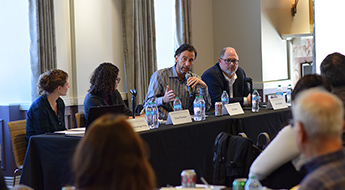Chloe Thurston
Associate Professor of Political Science
IPR Fellow and Chair of IPR’s Program on Race, Poverty, and Inequality
PhD, Political Science, University of California, Berkeley, 2013
Political scientist Chloe Thurston’s research is at the intersection of American political development and political economy and has focused on the development of social and economic policies, interest groups and social movements, institutional change, and historical analysis. Prior to coming to Northwestern in 2014, she was a postdoctoral fellow at Johns Hopkins University. She has been a Northwestern Public Voices Fellow and a Hewlett Teaching Fellow. In 2019–20, she was a member of the School of Social Sciences at the Institute for Advanced Study in Princeton, N.J.
Thurston is the author of At the Boundaries of Home Ownership: Credit, Discrimination, and the American State (Cambridge University Press, 2018), which received the 2020 J. David Greenstone Award from the American Political Science Association’s Politics and History Section, and co-author (with Emily Zackin) of The Political Development of American Debt Relief (University of Chicago Press, 2024). Her research has been published in Perspectives on Politics, the Journal of Public Policy, Studies in American Political Development, and Politics, Groups, and Identities. Her op-eds have appeared in Ms. Magazine, Slate, and in the Washington Post.
Current Research
The Politics of Credit, Debt, and Asset Inequality in the U.S. Thurston examines the important role that the federal government played since the 1930s in who could obtain home mortgages and uncovers the important role of citizen efforts to expand access to home ownership to groups discriminated against. Advocacy groups, including the NAACP and the Women’s Equity Action League, fought for minorities, women, and low-income people against discriminatory government policies such as restrictive covenants that limited home ownership. More recently, Thurston’s work has examined the role of interest groups, racial conflict, and political geography in explaining the unequal development of who gets access to debt relief. She is currently working on a project that examines the politics of the ownership society in the wake of the minority rights revolution of the 1960s and 1970s.
Policy Feedback’s Limited Effects. With IPR political scientist Daniel Galvin, Thurston is studying the limited ability of policy feedback processes to cement partisan loyalties, especially in the Democratic Party. Although Democrats have relied on policy success as if it were political success—believing voters would support the party because of its policies—the researchers find that elections are not won by policy accomplishments. Instead, political parties need to strengthen party organization. They are currently extending their work to understand the political development and complexities of deliverism.
State Policy Context and Education Policy. Together with IPR political scientist Tabitha Bonilla, Clare Macievus, and Matthew Nelson, Thurston is studying how the changing state and local educational policy context and conflict around divisive concepts legislation is shaping patterns of political socialization within families and among young people.
Selected Publications
Books
Zackin, E., and C. Thurston. 2024. The Political Development of American Debt Relief. Chicago: University of Chicago Press.
Thurston, C. 2018. At the Boundaries of Home Ownership: Credit, Discrimination, and the American State. New York: Cambridge University Press.
Winner of the American Political Science Association's 2020 J. David Greenstone Award, Politics and History Section, for best book.
Publications
Thurston, C. 2023. How should we govern housing markets in a moral political economy? Daedalus 152(1): 194–7.
Bateman, D., J. Grumbach, and C. Thurston. 2023. Race and historical political economy. In The Oxford Handbook of Historical Political Economy, C37P1–C37N5, eds. J. Jenkins and J. Rubin (Online: Oxford Academic Press).
Galvin, D. and C. Thurston. 2022. APD as a problem-driven enterprise. Studies in American Political Development 36(2): 156–8.
Michener, J., M. SoRelle, and C. Thurston. 2022. From the margins to the center: A bottom-up approach to welfare state scholarship. Perspectives on Politics 20(1): 154–69.
Thurston, C. 2021. Racial inequality, market inequality, and the American political economy. In American Political Economy, 133–57, eds. J. Hacker, A. Hertel-Fernandez, P. Pierson, and K. Thelen (New York: Cambridge University Press).
Thurston, C. 2020. Hidden fees? The hidden state framework and the reform prospects for systems of monetary sanctions. UCLA Criminal Justice Law Review 4(1): 283–92.
Galvin, D. and C. Thurston. 2020. The limited party-building effects of policy feedback. In An Unsettled Time: American Political Development and the Trump Presidency, 28–39, eds. P. Rocco and Z. Callen (Philadelphia: University of Pennsylvania Press).
Karol, D. and C. Thurston. 2020. From personal to partisan: Abortion, party, and religion among California state legislators. Studies in American Political Development 34(1): 91–109.


